Direct Examination
THE COURT: All right, Mr. Walczak, you may continue.
MR. WALCZAK: Thank you, Your Honor.
Q. Dr. Padian, what is intelligent design?
A. As I understand the definition, intelligent design is the proposition that there are some things, natural phenomena in the world that could not have come to being by natural means and that the design of these structures has a certain complexity and certain features that implies that they must have been produced by what is called an intelligent designer by which is understood to mean possibly some kind of unknown forces or a supernatural being.
Q. And how is intelligent design different from creation science?
A. Well, it has some similarities, and it has some differences. Creation science is a movement that flowered mostly in the 1960s and 1970s. And creation science was an attempt by certain conservative Christian people with some science or engineering degrees to attempt to explain Bible stories or to find scientific evidence for Bible stories or explain them in scientific terms, that is, to attempt to justify them on scientific grounds.
Intelligent design doesn't have as its objective to validate Bible stories or any particular religious or creation stories, but what it shares with creation science, in part, is the insistence that things were designed and could not have evolved. And so over 90 percent of the corpus of intelligent design work has to do with basically trying to undermine the evidence for evolution and the concepts associated with evolution and related sciences.
Q. And we're going to spend a good bit of time talking about the undermining attempt, the undermining of the evolutionary science.
As I understand it, the affirmative argument for design, not the criticism of evolution, but the affirmative argument for design is that it looks designed or it's so complicated we can't imagine that it couldn't have been designed. Is that your understanding?
A. That's my understanding, in an informal sense, that that's what they mean.
Q. What's wrong with this appearance of design analysis from a scientific standpoint?
A. Well, it's not particularly rigorous. Lots of things look designed, but they may not necessarily be designed. Intelligent design looks a lot like science in some respects, but it's only superficial. It doesn't operate according to the principles of science, so the resemblances are superficial.
And appearances can be deceiving. For all the world, it looks like, you know, to us normal people, that the sun goes around the Earth. And for most people, it wouldn't make a difference whether the sun went around the Earth or it went around the moon, as Sherlock Holmes famously said to Watson. But when the renaissance scholars understood, found out that, in fact, the sun does not go around the Earth but the Earth and the planets go around the sun, it changed the way we look at the whole natural world in a very important and fundamental way.
And so part of the process of science is to discover things that will make a difference to our understanding of the natural world and not simply to reinforce appearances that are very difficult to test in an objective or testable sense.
Q. Let's begin to talk about the problems that you have with how intelligent design represents science, and I want to focus on the areas of science within your expertise. What is wrong with the intelligent design arguments against evolution?
A. Well, there are a number of systemic problems with the arguments about intelligent design.
Q. I'm sorry, Professor Padian, have you prepared an exhibit to help you explain this?
A. Yes. At your request, I've done some demonstratives that I hope may be of use in illustrating some of these things.
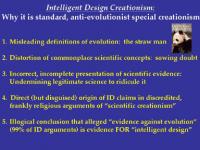 |
| Slide 1: Summary of why "intelligent design" is a form of creationism. |
| (Right-click to download pdf.) |
Introduction
Q. Matt, would you put up the first slide, please.
A. There are certain systemic problems with the way that intelligent design represents the scientific findings of the scientific community. And in a sense, it is really just standard anti-evolutionist special creationism. I will explain why it's special creationism in the course of things.
The ways that scientists have problems with intelligent design literature is, first of all, that it provides some misleading definitions of evolution. In doing so, it sets up a straw man. It also distorts some commonplace scientific concepts, and, as a result, it sows doubt in the minds of students who would understandably be confused, as I am, by their treatment of certain fairly standard ideas. When they --
Q. What kind of concepts do they sow doubt about?
A. Well, they begin -- if you want to begin with definitions of evolution, they define micro and macroevolution in different terms. Microevolution they're fine with. That's evolution in populations. It's just genetic variation. And creation scientists didn't have a problem with that stuff, either.
But when we study evolution, we actually look at it on several discrete levels. Microevolution is what happens in populations at the gene level and among individuals in populations within a species.
But then when populations diverge from each other geographically and genetically to the point where they become different species, different lineages that are not going to have a mixed history anymore but separate histories and diverge further and make more new species, we call this process speciation, and it's a different level of consideration than simply what happens in populations, because now you see we have the situation where we're no longer exchanging genes with each other in a population, we're actually looking at two separate or more separate entities that will be that way historically for the future.
Once we start looking at how these new lineages, new species and new species that they give rise to, interact in the environment, how they change further through time, how they adapt more to changing environmental conditions, we're now at the level that's called macroevolution. And the reason we call it macroevolution is it's just on a bigger level. We're no longer dealing with populations.
Q. And by "populations," you mean, like, people or horses or --
A. Well, like just groups of organisms. Individual organisms within a species are different populations. You can have a population in this valley, a population in that state, whatever it happens to be.
The way that scientists regard this is much like economists look at microeconomics and macroeconomics. Microeconomics is how you run the corner grocery store, you know, what the economic balance is in the small town's economy, how a company works. But macroeconomics has more to do with things like the Federal Reserve, the international balance of trade. The common thing that -- the thread between this is, of course, money. It's all about currency. It's cash at some level.
And with evolution, we've got genes that are very similar because everything is hereditary. It's transmitted. And the genetic transmission of this works one way within populations when organisms can exchange genes, but when you get above the species level, they're no longer exchanging genes. We're working at different species disporting themselves through time. And then you get the whole process of the evolution of new adaptations and major groups of animals and plants.
And the intelligent design people define macroevolution as a major change that has to happen to make a major group, and they say that this is a completely different process than what happens at the microevolutionary level. And scientists just don't think so.
Q. And are some of the other concepts that they don't quite represent accurately homology and cladistics and classifications?
A. Yes, the basic principles of classification, the principles also by which you can compare organisms in order to say things in comparative biology are very problematic for intelligent design creationists. They have a hard time explaining these in the terms that scientists use. And so a lot of what they do is to try to cast doubt on the very legitimacy of the basis of doing these things as scientists understand them.
Q. I'm sorry, continue. I believe you were on Number 3.
A. One of the problems with the ways that intelligent design creationists present scientific evidence is that they present only part of it. They present the part that might suit their cause, but they really leave out an awful lot of important research. And in so doing, they say that scientists don't know this or they can't know this. And this creates the sense of ridicule for students.
Now, you know, we'll be the first people to admit that science doesn't know everything and can't know everything. But on the other hand, we would like a fair and accurate representation of what we do know.
I would also like to show in the course of explaining some of these things today that most of the claims that the ID proponents make are directly inherited from the old-time scientific creationism claims in the evolution bashing that they do. Many of the same arguments are used, the same kinds of evidence are used.
And, finally, the conclusion that is raised is that if you can mount some kind of alleged evidence against evolution, which is most of what the ID proponents do, as the scientific creationists did, then this is evidence for intelligent design. In so doing, they set up this false dichotomy or contrived dualism of religion and science that is disturbing to scientists who have religious backgrounds, as well as to those who don't have religious backgrounds because it isn't part of science to do that.
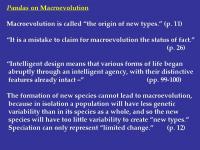 |
| Slide 2: Pandas on macroevolution. |
| (Right-click to download pdf.) |
Q. Now, you said that ID proponents mischaracterize evolution as just a starting point. Matt, could you put up the next slide.
A. Yes, calling macroevolution the origin of new types, this is not a definition that scientists would recognize. Macroevolution, as I mentioned, is looking at the patterns and processes of organisms above the level of species.
So we're trying to figure out a lot of the major patterns of evolutionary change, but the origin of new types, again, that word "origins" comes in, and scientists just don't talk about origins in that sort of cataclysmic sense.
The proponents of intelligent design, as you see here embodied in these quotes from Of Pandas and People, claim that it's a mistake to claim from macroevolution the status of fact. And, again, this confuses for students what facts mean in science.
In contrast, from Pandas, again from Page 99 to 100, they state, quote, that intelligent design means that various forms of life begin abruptly through an intelligent agency with their distinctive features already intact. And this tells you two things, first of all, that everything was already the way it was when things first appeared, so there's no transitions, and that an intelligent agency did this.
Now, that's a perfectly fine idea, but it's not scientific to claim this in advance of any kind of evidence that could be adduced to the contrary.
Q. But in order for this to be true, you have to show that evolution is false?
A. Yes, or at least you have to exclude the possibility of considering it in advance, which is a philosophical rather than an empirical consideration.
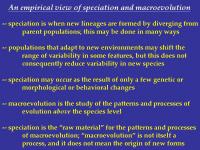 |
| Slide 3: Summary of speciation and macroevolution. |
| (Right-click to download pdf.) |
Q. If we could go to the next slide. You say that there are other definitions that intelligent design proponents confuse.
A. Yes. I would just like to clarify what we mean when we talk about speciation, macroevolution, which really differs from how it's treated in texts like Pandas. We call speciation what happens when new lineages are formed. They diverge from parent populations. That is, from old species new species bud off, if you will.
And this can happen in many different ways. You can have changes in behavior, in structure, in ecological adaptation, in physiology, in geography, and all these things may lead to the historical differentiation of these lineages. That's how we get new species. It's been happening ever since life was first running around on the planet.
Intelligent design proponents claim, for example, in Pandas that when speciation occurs, it actually limits variation, and so it's really unlikely that the kinds of changes we see in populations can actually lead to speciation.
I find this statement surprising because there's no evidence that I know of that when a new species forms, that genetic variability is necessarily reduced. It doesn't seem to be the case. Species that are closely related to each other, you don't find one with a lot less genetic variability than another that has ascribed to this process.
And so we regard speciation, in fact, as the raw material for the big changes through time. It's like births in a population are the starting point for populational change and development and the way that new species are formed. Without new species, we wouldn't get any kind of new developments in evolution.
Q. And that's contrasted with macroevolution how?
A. Well, the macroevolution -- then the speciation becomes the raw material for macroevolution, because macroevolution would be the study of what happens to those species after they're formed and as they deploy themselves through time, space, and ecology.
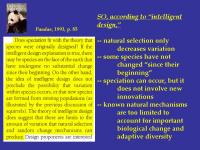 |
| Slide 4: ID says there are strict limits to evolutionary change. |
| (Right-click to download pdf.) |
Q. And, Matt, if you could turn to the next slide. And you're familiar with the textbook Of Pandas and People?
A. Yes.
Q. And do you believe that Pandas is a good representation of intelligent design theory or thinking?
A. I think it is. And I believe that the ID proponents also attest to this.
Q. And here we have a slide. We pulled out a passage from Page 85. This is what they say about speciation?
A. Yes.
Q. And could you read the highlighted passage?
A. The whole thing?
Q. Please.
A. It says, Does speciation fit with the theory that species were originally designed? If the intelligent design explanation is true, there may be species on the face of the earth that have undergone no substantial change since their beginning. On the other hand, the idea of intelligent design does not preclude the possibility that variation within species occurs or that new species are formed from existing populations as illustrated by the previous discussion of squirrels. The theory of intelligent design does suggest that there are limits to the amount of variation that natural selection and random change mechanisms can produce.
Q. So according to intelligent design, speciation is what?
A. Well, speciation is, for them, mostly unlikely on the basis of the kind of genetic variation that occurs. They're happy with genetic variation occurring within species. That's perfectly okay with them. That doesn't lead to much of anything. They say that speciation can occur, but it doesn't involve new innovations and that some species have not changed since their beginning. Now, we'll have to examine what we mean by "some."
But they do state that the known natural mechanisms are too limited to account for the important biological change and the adaptive diversity that we see through time.
Q. And if science's concept of speciation is, in fact, accurate, then that would mean that there's no abrupt appearance of organisms already intact?
A. Well, it certainly would mean that we are not finding new complex adaptations appearing all at once in major groups of organisms with no possibility of their evolution step by step from other kinds of creatures out there, and that's a point on which books like Pandas is quite adamant. They consistently say this does not occur.
Q. And is this argument from Pandas and by intelligent design proponents similar to the argument that creation scientists made?
A. Yes. It's quite similar in its ramifications.
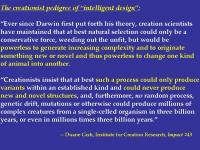 |
| Slide 5: Scientific creationist Duane Gish also claimed limits to evolutionary change. |
| (Right-click to download pdf.) |
Q. Could you put up the next slide, please, Matt. Could you tell us what this is, Professor Padian?
A. The slide is some text from a publication from the Institute for Creation Research called Impact Number 43 by Duane Gish. Duane Gish is vice president of the Institute for Creation Research, a famous creation scientist speaker who has been giving presentations against evolution for several decades now.
And what I'd like to show by this quotation included in the record is that the ideas of intelligent design reflect exactly what special creationists, what scientific creationists, so-called, were saying decades ago.
Here, for example, outlined in yellow on the top paragraph, Duane Gish says that natural selection would be powerless to generate increasing complexity and to originate something new or novel and thus powerless to change one kind of animal into another.
Now, by that is understood, at least, the basis of speciation, and this is very close to what the Pandas text says, and I think the idea really conveys the same message. In the bottom paragraph, Mr. Gish notes that such a process could only produce variance within an established kind and could never produce new and novel structures.
Q. I want to start talking about some of the areas of evolutionary biology and evolution that Pandas discusses and get your understanding of whether they are accurate representations of current scientific thought.
I've asked you to pick several examples out of Pandas where you believe that they do not accurately represent the science. And does the first one involve something called cladistics?
A. Yes. I wanted to talk a bit to explain, if I could, the basis for classification in science.
